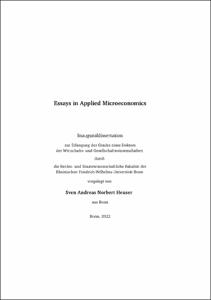Heuser, Sven Andreas Norbert: Essays in Applied Microeconomics. - Bonn, 2022. - Dissertation, Rheinische Friedrich-Wilhelms-Universität Bonn.
Online-Ausgabe in bonndoc: https://nbn-resolving.org/urn:nbn:de:hbz:5-67533
Online-Ausgabe in bonndoc: https://nbn-resolving.org/urn:nbn:de:hbz:5-67533
@phdthesis{handle:20.500.11811/10177,
urn: https://nbn-resolving.org/urn:nbn:de:hbz:5-67533,
author = {{Sven Andreas Norbert Heuser}},
title = {Essays in Applied Microeconomics},
school = {Rheinische Friedrich-Wilhelms-Universität Bonn},
year = 2022,
month = aug,
note = {One major goal of modern societies is to establish a cooperative and cohesive community. Though most people can agree on this goal, it is less clear how it can be achieved. To be able to make informed political changes towards its realization, it is necessary to understand not only the individual components of society in depth, the individual human being, but also how they live together and interact. Though these topics are at the heart of economics and social sciences more generally, there still remain many unanswered questions due to the complexity of individual and social behavior. For example, at a societal level, why do we observe a divide of society into distinct ideological camps and what can we do about it? Would it help to bring people together to talk? Would such a measure reduce stereotypes or could it even increase polarization? Likewise, questions of fairness and morality are similarly crucial to understand as they shape social behavior and give important insights when thinking about setting social rules. What determines moral behavior? To what extent is it driven by moral stances, and to what extent by intrinsic mechanisms and biases? However, it is also crucial to explore preferences and beliefs at the individual level. Only when we understand how beliefs and preferences are formed at the very basic level, we learn more about the way individuals ultimately behave. To give an example, why do we see so many different perceptions of how just the world is, even though everyone lives in the same world?
This thesis revolves around these broad questions. It seeks to contribute to the knowledge of how societies work and their members think and behave. Being at the heart of social sciences, it combines knowledge and tools not only from economics, but also related sciences like political science, psychology, sociology, and philosophy. The thesis comprises three chapters in total, each dealing with a different aspect of the above mentioned questions. Chapter 1 focuses on political preferences, beliefs and intergroup aversion asking whether conversations between like-minded individuals exacerbate political polarization and conversations between contrary-minded individuals reduce it. Chapter 2 examines how individuals morally evaluate others. Chapter 3 studies self-serving attributions in the formation of beliefs.},
url = {https://hdl.handle.net/20.500.11811/10177}
}
urn: https://nbn-resolving.org/urn:nbn:de:hbz:5-67533,
author = {{Sven Andreas Norbert Heuser}},
title = {Essays in Applied Microeconomics},
school = {Rheinische Friedrich-Wilhelms-Universität Bonn},
year = 2022,
month = aug,
note = {One major goal of modern societies is to establish a cooperative and cohesive community. Though most people can agree on this goal, it is less clear how it can be achieved. To be able to make informed political changes towards its realization, it is necessary to understand not only the individual components of society in depth, the individual human being, but also how they live together and interact. Though these topics are at the heart of economics and social sciences more generally, there still remain many unanswered questions due to the complexity of individual and social behavior. For example, at a societal level, why do we observe a divide of society into distinct ideological camps and what can we do about it? Would it help to bring people together to talk? Would such a measure reduce stereotypes or could it even increase polarization? Likewise, questions of fairness and morality are similarly crucial to understand as they shape social behavior and give important insights when thinking about setting social rules. What determines moral behavior? To what extent is it driven by moral stances, and to what extent by intrinsic mechanisms and biases? However, it is also crucial to explore preferences and beliefs at the individual level. Only when we understand how beliefs and preferences are formed at the very basic level, we learn more about the way individuals ultimately behave. To give an example, why do we see so many different perceptions of how just the world is, even though everyone lives in the same world?
This thesis revolves around these broad questions. It seeks to contribute to the knowledge of how societies work and their members think and behave. Being at the heart of social sciences, it combines knowledge and tools not only from economics, but also related sciences like political science, psychology, sociology, and philosophy. The thesis comprises three chapters in total, each dealing with a different aspect of the above mentioned questions. Chapter 1 focuses on political preferences, beliefs and intergroup aversion asking whether conversations between like-minded individuals exacerbate political polarization and conversations between contrary-minded individuals reduce it. Chapter 2 examines how individuals morally evaluate others. Chapter 3 studies self-serving attributions in the formation of beliefs.},
url = {https://hdl.handle.net/20.500.11811/10177}
}






